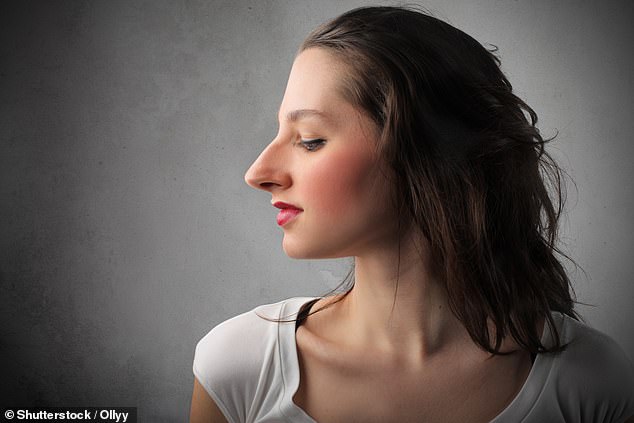- Facial features may be influenced by what your mother ate during pregnancy
- High-protein diets lead to wider noses and jaws, scientists say
<!–
<!–
<!– <!–
<!–
<!–
<!–
Each person’s unique facial features may have been influenced by what their mother ate during pregnancy, according to a study: High-protein diets lead to wider noses and jaws.
Subtle differences in people’s appearance, from the shape of their skull to the amount of cartilage in their nose, are created in the womb by genes triggered by nutrition.
The more protein consumed during pregnancy, the more active these genes, known as ‘mTORC1’, become.
Researchers say this can “fine-tune” a baby’s facial appearance by adjusting the length of the nose and width of the nostrils, the shape of the cheeks and the prominence of the jaw.
While the basic appearance of a human face is determined by the parents’ genes, siblings often look quite different, and even “identical” twins are never exactly alike.

Each person’s unique facial features may have been influenced by what their mother ate during pregnancy, study finds: High-protein diets lead to wider noses and jaws (file image)
The reason for these subtle differences has long puzzled scientists, but they now believe that the mother’s diet is partly responsible for the appearance of offspring.
In a study published in Nature Communications, the international researchers said: “We found that modulating the level of protein in maternal diet regulates mTORC1 activity, resulting in subtle but distinct changes in the craniofacial shape of embryos.”
They said this leads to a “spectrum” of different facial features.
Pregnant mice and fish were given different diets and the researchers found that they altered mTORC1 signaling in their uteruses, giving their offspring particular facial characteristics.


High-protein diets have been shown to cause enlarged facial features, with more pronounced jaws and thicker nasal cartilage (file image)
High protein diets have been shown to cause enlarged facial features, with more pronounced jaws and thicker nasal cartilage.
However, feeding mothers low-protein foods led to thinner faces and more pointed facial features.
The researchers said the phenomenon may give some animals an advantage depending on the environment they are born into.
In certain types of fish, babies are more likely to have longer, thinner noses if their mothers eat a diet low in nutrients. This gives the young an advantage when foraging in areas with low food availability.
